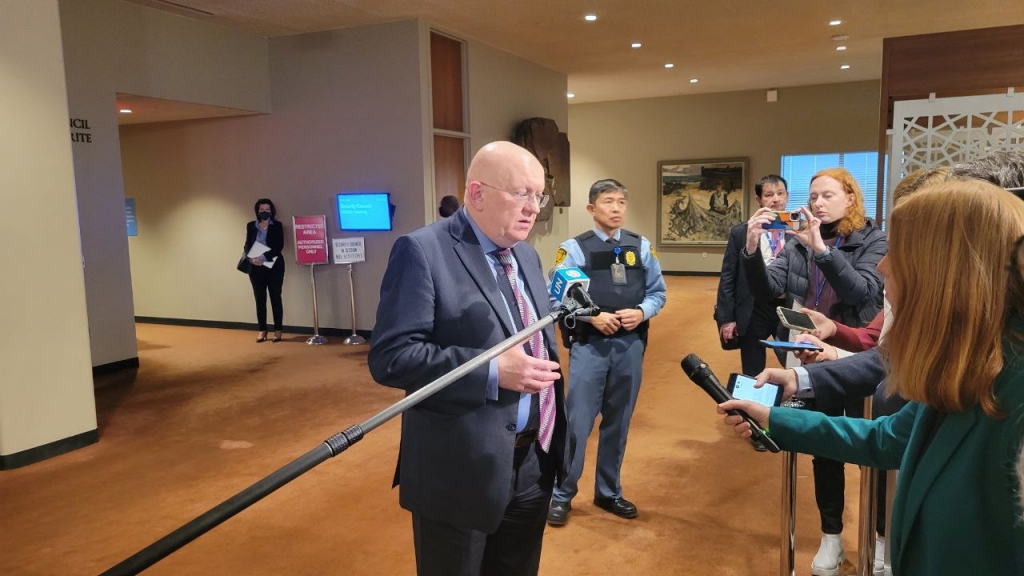Remarks to the Press by Permanent Representative Vassily Nebenzia following UNSC meeting on the humanitarian situation in Ukraine
Vassily Nebenzia: We had another meeting on the “humanitarian” situation in Ukraine. That was another exercise in anti-Russian rhetoric, which we have had last couple of week. I will not comment on the statements made. You've heard that and you heard our statement.
To a large extent, there was again an exercise in fakes. We noticed that today the Ukrainian Ambassador chose another tactics. He started to accuse us of what we accused the Ukrainians of. I do not engage in personal exchanges with him, but when he asked about the eyes of children killed, I would also like to ask him whether he had any remorse when he thought about the children of Donetsk that were killed by Ukrainian forces.
I will not dwell on who is more humane. That's not the point of my coming to you. I wanted to tell you what you heard at the end of my statement. Due to extreme hypocrisy and cynicism of our partners, who are advocating for immediate solution of difficult, somewhere dire humanitarian situation in Ukraine, they refused to discuss our draft. Our draft resolution was basically just based on their draft, but it was made humanitarian instead of political. But they just demonstrated that they didn't need a humanitarian resolution by the Security Council. As I said at the stakeout when we first announced our draft, they needed another resolution to blame and shame Russia.
That testifies to their real aims, and that's why they chose to go to the General Assembly. They are working tirelessly on the membership, we know that for sure, to make them vote in favor of that resolution, which will not be strictly humanitarian and which will not have an effect that the Security resolution would have. Just like they worked on the Security Council members to defeat and kill our resolution. So we decided not to go forward with our draft at this stage. We are not withdrawing it. We keep it in blue, but for the time being we will postpone voting on it.
Q: During your speech, you talked about pressure on countries. Can you be more explicit? Can you tell us that there is some pressure on China for example?
A: I'm sure there is pressure on all countries, like it was before the voting on the resolution in the General Assembly. I received calls from many Ambassadors. I will quote one in particular. An Ambassador told me that he would vote “yes” because he got instructions from his capital, despite that they wanted to abstain. He said we could not even imagine what kind of pressure and blackmail was exerted upon them by Western countries, in particular the United States. That's not a secret. They were working on that. Many delegations that were prepared to abstain on 2 March, received last-minute instructions to vote in favor. That is the result of the pressure. Same tactics is used here.
Q: I have colleagues who are out in Ukraine, who have seen with their own eyes the atrocities being committed by Russia in Ukraine. You've been in the United States the whole time. Who's more likely to know what exactly is going on?
A: What kind of atrocities are you referring to?
Q: I'm talking about narrow trenches in Mariupol with babies’ bodies in. I'm talking about theaters in Mariupol being bombed by Russia.
A: The theater in Mariupol was not bombed by Russia. I spoke about it, and you may refer to my statement. I do not know anything about the trenches with killed babies. I haven't seen it, but I've seen so many fakes. We have disinformation war, which is raging on a much greater scale than what is on the battlefield. I will not be surprised at anything because who wins the information war wins the war.
Q: We often hear Russia as a permanent member saying that there needs to be a diplomatic solution. You tell this to other countries countless times. Why here will you not call for a ceasefire, stop the offensive and negotiate with Ukraine?
A: We are negotiating with Ukraine.
Q: Why not stop the fighting?
A: Because we came there with goals announced. We want to demilitarize Ukraine, to denazify it, and to make Ukraine a neutral state which is not threatening Russia. Negotiations are going on.
Q: What evidence are you going to bring tomorrow on chemical and biological weapons?
A: We have additional new information on that, and I think it deserves being discussed in the Security Council. That's not a joke, that's not Russian propaganda. More people in the West, including US and UK, are asking questions on that military bioprograms that the US was conducting in Ukraine, and not just in Ukraine. That also applies to many US-sponsored laboratories around the world.
